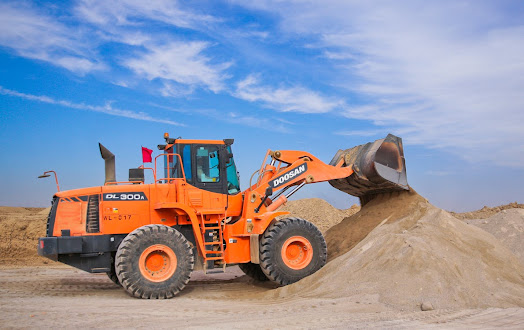A Comprehensive Guide: How To Properly Inspect Used Heavy Equipment Before Buying
Investing in used heavy equipment
can be a prudent decision for construction companies, contractors, and
businesses operating in industries like mining, agriculture, and
transportation. However, purchasing pre-owned machinery requires careful
consideration and thorough inspection to ensure optimal performance, safety,
and value for money. In this informative blog, we'll delve into the essential
steps and considerations involved in properly inspecting
used heavy equipment before making a purchase, empowering buyers to
make informed decisions and mitigate risks.
Research and Preparation:
Before inspecting any used heavy equipment, it's crucial to conduct thorough research and preparation. Familiarize yourself with the specific make and model of the equipment you're interested in, including its features, specifications, common issues, and market value. Additionally, gather relevant documentation such as maintenance records, service history, and ownership documents to gain insights into the equipment's maintenance and usage patterns.Visual Inspection:
Begin the inspection process with
a comprehensive visual assessment of the used heavy equipment. Look for signs
of wear and tear, corrosion, rust, leaks, and structural damage on the exterior
and interior components. Pay attention to critical areas such as the engine,
hydraulic systems, undercarriage, tires, tracks, cabin, and attachments. Check
for any visible cracks, dents, welds, or modifications that may indicate
previous damage or repairs.
Functional Testing:
After completing the visual
inspection, proceed to conduct functional tests to assess the operational
performance of the equipment. Start the engine and listen for any unusual
noises, vibrations, or exhaust emissions that may indicate mechanical issues. Test
all operational controls, switches, levers, and gauges to ensure they function
smoothly and accurately. Operate the equipment through its full range of
motions, including lifting, digging, steering, and braking, to evaluate its
overall functionality and responsiveness.
Fluid Analysis:
Inspecting the fluids and
lubricants of the used heavy equipment is essential for assessing its
mechanical condition and identifying potential issues. Check the oil levels,
consistency, and color of engine oil, hydraulic fluid, transmission fluid,
coolant, and fuel. Look for any signs of contamination, discoloration, foaming,
or excessive debris, which may indicate internal component wear, leaks, or
fluid degradation. Consider performing fluid analysis tests to determine the
presence of contaminants, moisture, and metal particles, providing valuable
insights into the equipment's health.
Structural Integrity:
Assessing the structural
integrity of the used heavy equipment is critical for ensuring its safety and
longevity. Inspect the frame, chassis, boom, arm, bucket, and other structural
components for signs of cracks, bends, welds, or fatigue. Check for alignment
discrepancies, uneven wear patterns, and loose or missing bolts, pins, and
fasteners that may compromise the equipment's stability and structural
integrity. Conduct thorough inspections of the undercarriage, tracks, rollers,
sprockets, and idlers for wear, damage, and alignment issues, especially in
tracked equipment.
Documentation Review:
In addition to conducting
physical inspections, review all relevant documentation and paperwork
associated with the used heavy equipment. Verify the equipment's serial number,
VIN (Vehicle Identification Number), and registration details to ensure its authenticity
and legal compliance. Examine maintenance records, service logs, repair
invoices, and warranty information to assess the equipment's maintenance
history, repair work, and warranty coverage. Seek clarification on any
discrepancies or red flags identified during the inspection process.
Professional Inspection:
While buyers can conduct
preliminary inspections themselves, hiring a professional inspector or
technician is highly recommended for assessing the technical condition and
reliability of used heavy equipment. Experienced inspectors have specialized
knowledge, diagnostic tools, and expertise to identify hidden issues, evaluate
critical components, and provide objective assessments of the equipment's
condition. Consider engaging certified mechanics, engineers, or inspection
agencies to perform thorough inspections and provide detailed reports with
recommendations for repair and maintenance.
Negotiation and Purchase:
Armed with the findings from the
inspection process, buyers can enter into negotiations with the seller to
finalize the purchase of the used heavy equipment. Use the inspection report as
a bargaining tool to negotiate a fair price based on the equipment's condition,
market value, and estimated repair costs. Consider including provisions for
warranty coverage, post-sale support, and inspection contingencies in the
purchase agreement to protect your interests and mitigate risks. Ensure all
legal and financial aspects of the transaction are properly documented and
verified before completing the purchase.
Read more: Pros
Cons of Used Imported Machinery | Verified
9999+ Businesses for Sale in India
Conclusion:
Inspecting used heavy equipment
before buying is a critical step in ensuring reliability, safety, and value for
money. By following the steps outlined in this comprehensive guide, buyers can
conduct thorough inspections, identify potential issues, and make informed
decisions when purchasing pre-owned machinery. Whether you're investing in
excavators, bulldozers, loaders, cranes, or trucks, prioritizing proper
inspection procedures will help mitigate risks, minimize downtime, and maximize
the return on investment for your business.
IndiaBizzness is your ultimate B2B portal connecting businesses
across India. Discover a vast network of suppliers, manufacturers, wholesalers,
and service providers in various industries. Seamlessly navigate through our
user-friendly platform to find the products or services you need.
Source:
https://sites.google.com/view/indiabizznessb2b/blog/inspect-used-heavy-equipment-before-buying




Comments
Post a Comment